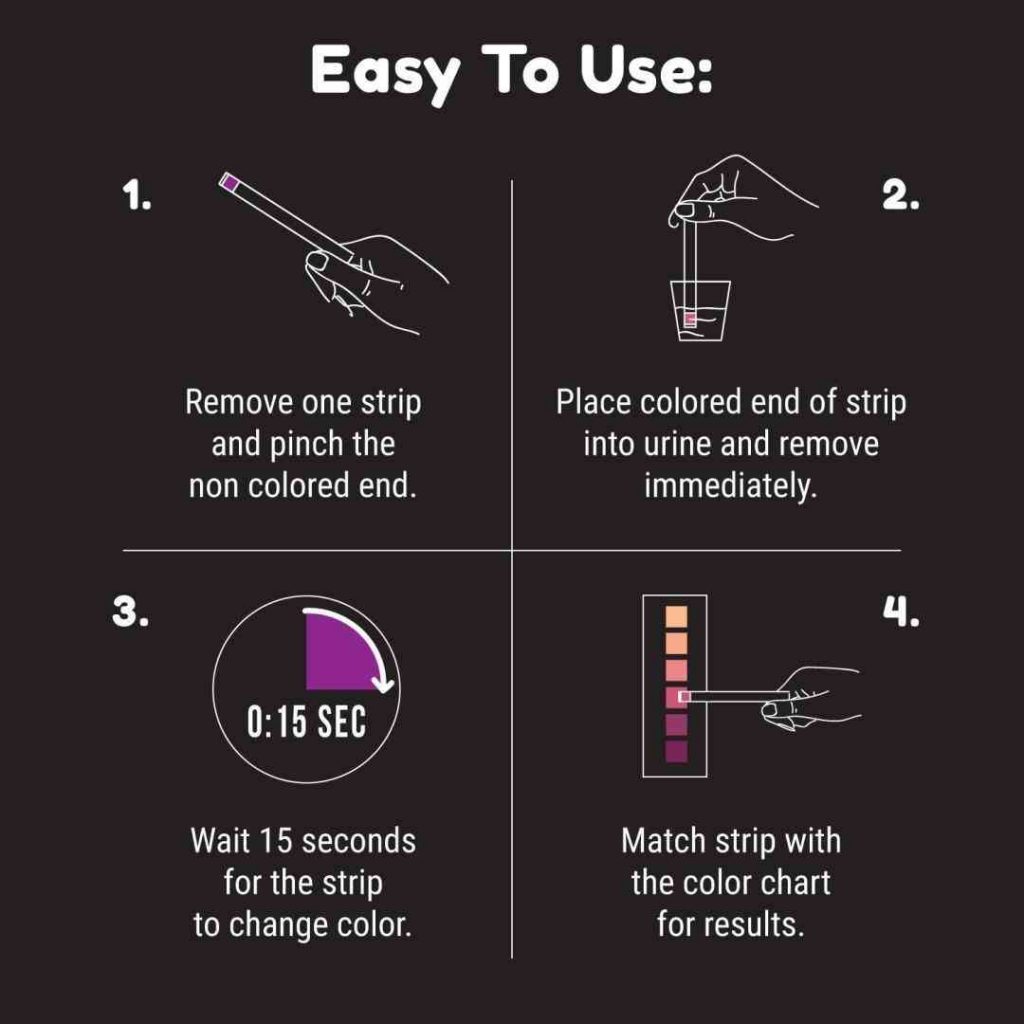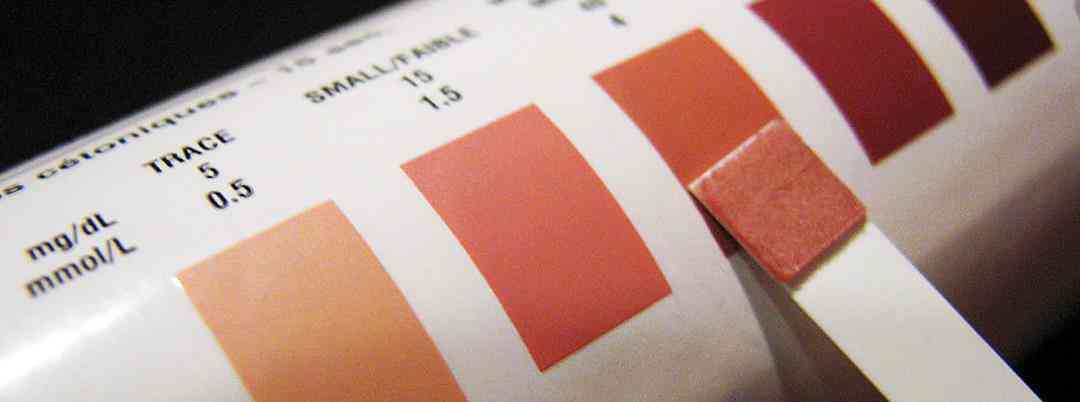Ketones are a specific type of chemical that build up in your body when it transitions to burning fat for energy rather than carbohydrates. The process of your body burning fat rather than carbohydrates is called ketosis.
As your body transitions from one energy source to another, you will burn ketones along with fat as an energy source. A good way to measure your body’s progress switching to ketosis by measuring your ketone levels. A urine test is a common method for measuring the number of ketones within your body.
When is the Best Time to Test Ketones in Urine?
Typically, it is recommended to test for ketones multiple times a week. One study suggests that ketones are most reliably detected in the first urine of the day and a few hours after dinner in the evening. These are the times at which ketone levels are at their highest.
Obtaining an accurate ketone measurement in urine can be difficult. This is because of two factors: meals and physical activity. Both of these factors can create false results in urinary ketone tests. Therefore, it is better to test your ketone levels at the beginning or end of the day.
Why Should You Test Ketones in Urine?
Cheapest Method of Testing
First of all, testing your ketone levels via a urine test is much cheaper than other ketone testing methods. A pack of one-hundred testing strips for ketones can typically be purchased for around ten dollars.
That is just ten cents per strip, which means testing your ketone levels using urine tests shouldn’t break your bank. It’s an affordable, reliable way to know where your body’s ketone levels fall.
More Convenient Than Other Testing Methods
Secondly, urine testing is so much more convenient than other ketone testing methods. You can easily purchase testing strips and check your ketone levels at any place and any time.
Plus, it’s arguably preferable to having to prick your own finger on a consistent basis throughout the day. Urine testing is much less invasive than other methods of testing ketone levels.
Quick and Efficient Way to Track Progress
Thirdly, testing your ketone levels is a smart way to figure out how effective your keto diet has been for your weight loss goals. By learning where your ketone levels stand, you can better strategize how to utilize your diet to meet your desired outcome.
Using a urine test to measure your ketone levels can provide some quick and efficient insight into how much fat your body is burning. Higher ketone levels in your results means that your body is burning a significant amount of fat.
How to Test Urine for Ketones?
Be sure to follow these steps to ensure you get accurate ketone level results from your urinary test.
- To test your ketone levels using a urine strip test, be sure to urinate on the testing stick. Be sure that your testing strip is within its expiration limits. Usually, test strips expire around six months after opening the bottle. Also, ensure that you take your test during your first urine of the day or a few hours after your dinner at night.
- Once the stick has been used, a color will appear on the stick for you to match with one of the corresponding reference colors within your urinary test kit. Be sure to match this color with one of the reference colors to ensure you get a correct understanding of your results.

Tips for Testing Urine for Ketones
All of the following tips will help you with testing your urine for ketone levels:
- Ensure your urine test strips are within the expiration date
- Store test strips with a sealed lid
- Keep your test strip bottle in a dry, cool area
- Do not store urine testing strips in the refrigerator
- Do not keep test strips in a hot area or in direct sunlight
- Do not remove silica packet from test strip bottle
- Do not be overly hydrated or dehydrated when testing your urine
- Make sure your hands do not make contact with test strip material
What is Good Level of Ketones for Ketosis?
A good level of ketones for ketosis is entirely dependent on your ketosis goals. Some people only want a light level of ketones within their body (around 0.5 mmol/L-1.0 mmol/L). This is a decent and achievable starting point if you are new to the keto diet or transitioning your body into ketosis. This goal is optimal for those who are interested in ketosis for weight loss.
However, if you are interested in switching your body into ketosis for a medical condition, such as cancer, epilepsy, or a metabolic disorder then you might want to aim for higher ketone levels. Anywhere within the 3.0 mmol/L -5.0 mmol/L range is optimal for you.
Remember, whatever you reasoning for switching to ketosis, you will reach your optimal ketone level in time. Be sure not to take drastic measures, such as fasting, to reach your goal. With a strict diet and consistent self-discipline, your ketone levels will eventually be exactly where you need them to be in order to get the results you desire.
Other Ways to Measure Ketones
There are other ways to measure your body’s ketone levels besides urine testing. For instance, testing your blood for ketone levels is another popular method for ketone testing.
Blood Test
For a blood test, you will use both a testing strip and a pricking device to withdraw blood from your fingertip to test. Blood testing for ketone levels provides accurate results very quickly.
However, the device and strips may be more expensive materials to perform a ketone level test. Also, the blood test is a bit more invasive than urine testing, as you need to prick your finger each time in order to get a reading.
Breath Test
Another way to test your body’s ketone levels is to use a breath test. This test measures the amount of acetone present in your breath. The materials required to perform this test is simply one ketone breath meter. Many companies have made this product available and it should be easily attainable.
The upsides to breath testing for ketone levels is that there are no strips required, as you only use one device to get a reading. However, the disadvantage of breath testing for ketone levels is that it is less accurate than other testing methods. Also, it is less convenient than just using a test strip to find ketone levels in urine.
Urine Ketone FAQs
Usually, ketones in urine are not dangerous. As long as you are transitioning into ketosis responsibly and with dietary self-discipline, you should have nothing to worry about.
However, if you have diabetes that has not been diagnosed or managed, then your ketone levels can definitely affect you negatively. Ketones can build up in you and do everything from dehydrating you to changing your blood’s overall toxicity. This usually can lead to a coma or even death.
Anywhere between 1.6-3.0 mmol/liter is a dangerous level of ketones. If your ketone levels are within this margin, it means you are experiencing or at risk for diabetic ketoacidosis. This means that a buildup in ketone levels that literally changes your blood toxicity levels has occurred within your body.
Be sure to contact your doctor immediately if your ketone testing results display levels this high. The consequences of ignoring ketone levels this high could be fatal.
No, ketones do not cause UTIs. A UTI, or urinary tract infection, is almost always caused by bacteria making their way into your urinary tract. However, if your doctor tests your urine when a UTI occurs, they may also check your ketone levels in the same test.
Be sure to realize that if your doctor returns your urine test results with a report on your current ketone levels it does not mean the ketones are the culprit. This just means that your doctor decided to comprehensively test the sample you provided.
This is good because ketone levels that are too high can lead to other medical issues such as diabetic ketoacidosis. As far as UTIs go, however, bacteria are almost always the cause.
Unless you have an incredibly high number of ketones in your urine, you should not smell the ketones within your urine. Diabetic ketoacidosis is a deadly condition in which ketone levels build up too much, and it usually occurs in people who have diabetes that goes unchecked.
One of the symptoms of diabetic ketoacidosis is a urine odor commonly described to have a likeness to the smell of popcorn. If you suspect you are at risk or experiencing diabetic ketoacidosis, contact a doctor immediately. Ignoring this condition can have fatal consequences.
There are a few ways you can naturally lower your body’s ketone levels. One incredibly easy way to lower ketones is to drink extra water. This will help flush them out of your system.
For diabetics, regularly checking your blood sugar every three to four hours as well as avoiding exercise when your blood sugar is high will help tremendously when trying to lower ketone levels.
Don’t forget to share this helpful article with your Keto friends!






